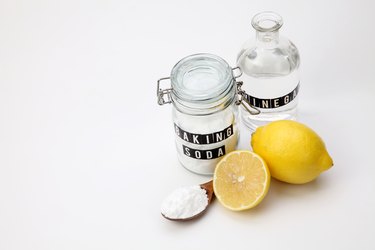
Citric acid and vinegar have a lot of overlap when it comes to their versatility — both are commonly used as food flavorings and cleaning agents. They are also both made using a fermenting process. But they're different compounds and shouldn't be confused.
Tip
Vinegar is actually made of acetic acid, not to be confused with citric acid.
Video of the Day
Here's what you should know about citric acid and vinegar, as far as their similarities and differences go.
Video of the Day
Read more: Is White Vinegar Good for Health?
How Is Vinegar Made?
You've probably seen many different types of vinegar on the market — white vinegar, balsamic vinegar, rice vinegar, wine vinegar and so on. What these pungent, sour liquids have in common is that they are all made from fermented carbohydrates.
The Vinegar Institute explains that vinegars can be made from anything with sugar or starch. Yeast and bacteria called acetobacter serve as the microorganisms that convert these carbohydrates. First, the yeast changes the sugars to alcohol; then the acetobacter turn the alcohol to acetic acid.
It's important to distinguish that, although vinegar contains acetic acid, which is what gives vinegar its distinctive flavor, acetic acid and vinegar are not the same thing. The National Capital Poison Control lists different types of vinegar as having different amounts of acetic acid. White vinegar, for example, is about 4 to 7 percent acetic acid. Its other ingredients are water, amino acids, mineral salts and nonvolatile organic acids.
Considering similarities between citric acid and vinegar, the American Chemistry Council explains that citric acid is a naturally occurring compound in fruits and vegetables, most commonly in lemons and limes. However, citric acid can be manufactured, and it is made in a way similar to vinegar: by using a microorganism, the fungus Aspergillus niger (black mold), in this case to ferment sugars.
Citric Acid Vs. Acetic Acid
Although citric acid and vinegar are different products, they are used in many of the same ways. So is there a better choice when you compare citric acid versus acetic acid?
The Harvard T.H. Chan School of Public Health cites the ways in which vinegar has been used for thousands of years as a medicine, preservative and food flavoring. Some ancient cultures used it as a digestive aid or to clean wounds or cure coughs.
Unfortunately, there's no scientific evidence to support these medicinal uses. The National Capital Poison Center specifically emphasizes that vinegar won't inhibit the growth of bacteria that cause wound infections; however, the Mayo Clinic does encourage using a blend of white vinegar and rubbing alcohol to prevent the growth of fungi and bacteria that can cause swimmer's ear.
Vinegar can be also used for cleaning. The Harvard T.H. Chan School of Public Health states that vinegar with 5 percent acetic acid is powerful enough to fight a few household pathogens, but you shouldn't count on it to get rid of stronger ones, such as salmonella.
However, it's a good nontoxic, environmentally friendly option for getting rid of mineral deposits and soap scum around your shower. Just make sure you don't mix it with bleach, as this will result in a harmful chemical reaction.
As far as citric acid goes, the American Chemistry Council states that it can be used to kill harmful bacteria and infections on the skin. You can also use citric acid for cleaning; it is especially good for removing hard water buildup on dishes as well as getting out coffee and tea stains. New Mexico State University notes that citric acid and acetic acid serve the same functions as cleaning agents.
Both citric acid and vinegar are reliable food flavorings and preservatives. Vinegar is used to make pickles and other fermented foods, while citric acid can prevent things like botulism in canned foods and browning on fruits and vegetables. Citric acid can serve as an emulsifying agent and a sour flavoring in processed and packaged foods, and vinegar makes a great marinade or dressing when blended with oil.
Keep a bottle of vinegar around your kitchen or in your pantry, and you're bound to find a use for it.
- Vinegar Institute: “Frequently Asked Questions”
- National Capital Poison Control: “Vinegar”
- Harvard T.H. Chan School of Public Health: “Vinegar”
- American Chemistry Council: “Citric Acid”
- New Mexico State University: "Selection and Use of Home Cleaning Products"
- Mayo Clinic: "Kids' Swimming: Keep Health Risks at Bay"